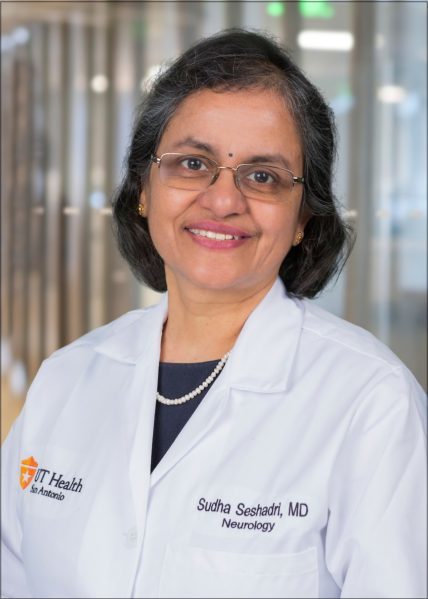 Sudha Seshadri, M.D.
Sudha Seshadri, M.D.
Sudha Seshadri, M.D., professor of neurology at UT Health San Antonio and founding director of the university’s Glenn Biggs Institute for Alzheimer’s and Neurodegenerative Diseases, made the following statement about the Alzheimer’s Disease Sequencing Project, findings of which were announced Tuesday, Aug. 14. Dr. Seshadri is a principal investigator of the research, which was developed jointly by the National Institute on Aging and the National Human Genome Research Institute in response to the National Alzheimer’s Project Act.
“This genetics study of more than 5,700 late-onset Alzheimer’s disease cases and more than 5,000 cognitively normal controls has found three more needles in the haystack of Alzheimer’s—three genes associated with the disease that have not been on our radar screen,” Dr. Seshadri said. “This is an exciting finding because every gene mutation we identify is another step toward understanding the basic biology of Alzheimer’s, and brings us one step closer to more-effective Alzheimer’s treatments.”
Late-onset Alzheimer’s disease is linked to many genes; at least 30 susceptibility genes have been identified previously. The novel Alzheimer’s-associated gene variants identified in the Alzheimer’s Disease Sequencing Project are involved in immune response and a process called transcriptional regulation, the project authors reported.
The nearly 11,000 persons in the study come from two large research groups. One is the Cohorts for Heart and Aging Research in Genomic Epidemiology (CHARGE) Consortium. Dr. Seshadri leads the CHARGE Neurology Working Group. The other is the Alzheimer’s Disease Genetics Consortium (ADGC) led by a group at the University of Pennsylvania. CHARGE and ADGC together form the Alzheimer’s Disease Sequencing Project, on which Dr. Seshadri is a principal investigator.
The University of Texas Health Science Center at San Antonio, now called UT Health San Antonio, is one of the country’s leading health sciences universities. With missions of teaching, research, healing and community engagement, its schools of medicine, nursing, dentistry, health professions and graduate biomedical sciences have produced 35,850 alumni who are leading change, advancing their fields and renewing hope for patients and their families throughout South Texas and the world. To learn about the many ways “We make lives better®,” visit www.uthscsa.edu.
The post Comment about findings of the Alzheimer’s Disease Sequencing Project appeared first on UT Health San Antonio.